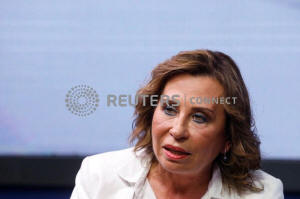|
Guatemala election headed for runoff,
former first lady Torres leads
 Send a link to a friend
Send a link to a friend
 [June 17, 2019]
By Adriana Barrera and Sofia Menchu [June 17, 2019]
By Adriana Barrera and Sofia Menchu
GUATEMALA CITY (Reuters) - Guatemala's
presidential election appeared to be headed for a runoff as partial
results on Monday gave center-left candidate Sandra Torres an early lead
but far short of the majority needed to avoid a second round against a
conservative rival.
With votes tallied from 42% of polling stations, preliminary results
from Sunday's election gave former first lady Torres 24.18% of the vote,
followed by conservative Alejandro Eduardo Giammattei with 15%, the
electoral tribunal said.
The presidential race, which groups 19 candidates, appeared all but
certain to be headed for a second round of voting on Aug. 11. The head
of the electoral tribunal said late on Sunday it could take
approximately two weeks to have definitive results from across the
Central American country.
Guatemala's next president will face the daunting challenge of curbing
drug gang violence that has ravaged the country and helped spur illegal
immigration to the United States, stoking tensions with President Donald
Trump.
Torres, of the center-left UNE party, has led the race to succeed
President Jimmy Morales, a conservative former television host whose
term has been blighted by accusations of corruption made by U.N.-backed
investigators.

Nevertheless, Torres also has high negative ratings and may struggle to
win a direct run-off if supporters of the many right-of-center
candidates unite against her.
In third place with 12.11% was Edmond Mulet, a former U.N. official
whose conservative candidacy gained traction in recent weeks.
Torres, who wants to send troops into the streets to fight drug gangs,
and use welfare programs to tackle poverty, extended a hand to
Guatemala's business elite when voting on Sunday.
"We have to sort out our problems here, and part of the reason for the
migration is the lack of jobs, the gap in wages between the United
States and here," she said. "We need to work with the business community
to revive the economy."
Rampant violence and widespread discontent over corruption and impunity
in the country of 17 million have prompted more and more Guatemalans to
flee for the United States.
The surge of departures has undermined Trump's pledge to curb illegal
immigration, and the U.S. president has responded by threatening to cut
U.S. aid to Central America.
[to top of second column]
|

Sandra Torres, presidential candidate for the National Unity of Hope
(UNE) talks to the media following the first round of presidential
election, at the official voting result center in Guatemala City,
Guatemala June 17, 2019. REUTERS/Luis Echeverria

That prospect has caused alarm in Guatemala, where the legacy of the
bloody 1960-1996 civil war still casts a long shadow over the
country's development.
COALITION PROSPECTS
Rain fell on Guatemala City during Sunday's vote and results
suggested there was considerable discontent among the electorate
about the choice of candidates on offer. More than 12% of votes cast
were blank or spoiled ballots, the early count showed.
Morales, who is barred by law from seeking re-election, took office
in 2016 vowing to root out corruption after his predecessor was
brought down by a probe led by the U.N.-backed International
Commission against Impunity in Guatemala (CICIG).
Instead, Morales himself became a target of a CICIG probe into
allegations of campaign finance wrongdoing and was subject to
impeachment proceedings in 2017.
He survived the attempt to oust him, and then engaged in a bitter
dispute with the CICIG before finally terminating its mandate,
effective from September.
None of the top contenders has unequivocally backed the CICIG, with
Torres saying she would consider holding a referendum on whether it
should remain in Guatemala.
Fernando Escalante, 41, an industrial design adviser, said the next
president must continue the fight against corruption.
"I fear all the progress we've made could be lost, but maybe it's
time for us Guatemalans to take on the task," he said.

Questions of legitimacy have dogged the 2019 contest since two of
the front-runners were forced out, including Thelma Aldana, a former
attorney general who tried to impeach Morales with the CICIG. The
government accused Aldana of corruption, leading to her exclusion
last month.
(Reporting by Daniel Flynn; editing by Darren Schuettler)
[© 2019 Thomson Reuters. All rights
reserved.]
Copyright 2019 Reuters. All rights reserved. This material may not be published,
broadcast, rewritten or redistributed.
Thompson Reuters is solely responsible for this content. |